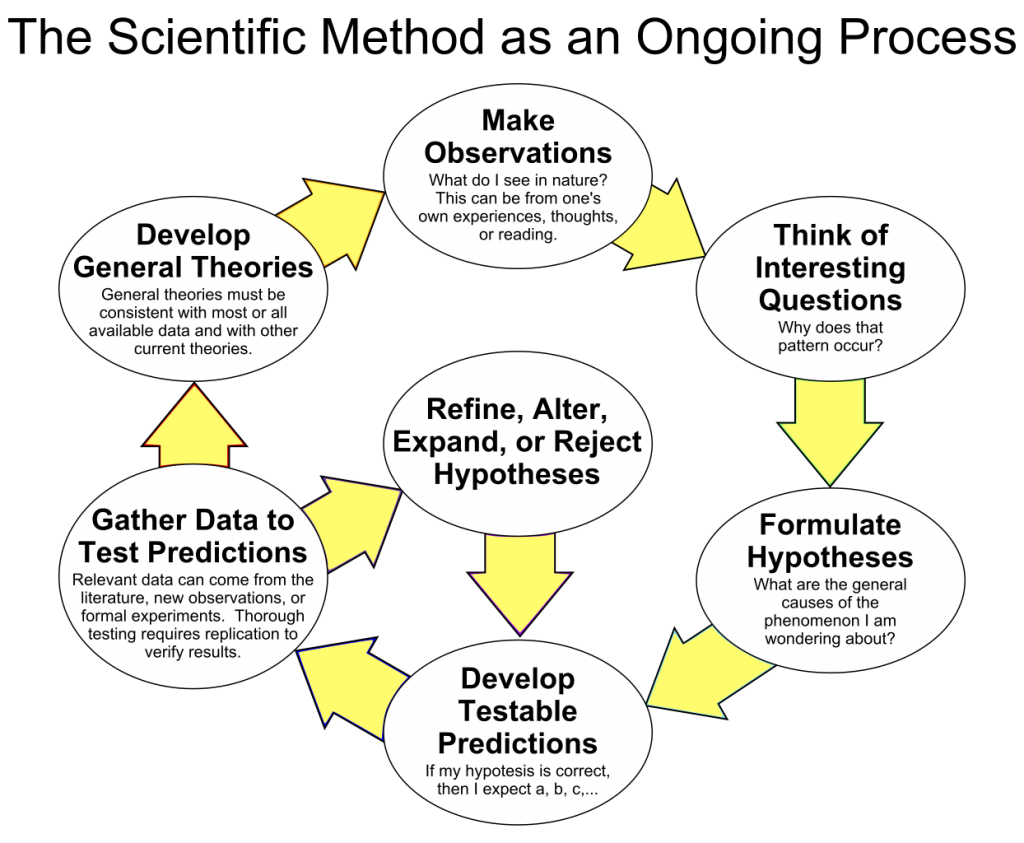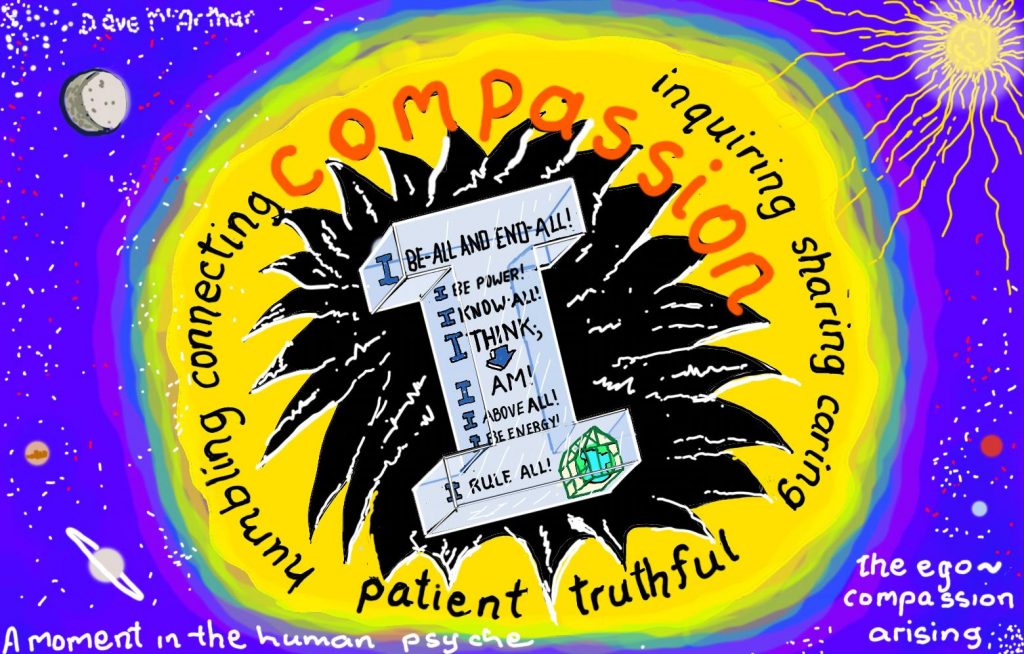
Welcome to all fellow scientists and that includes you, regardless of your age, education, gender or religion. It even includes those of you who call yourself a “Scientist” or a “Science Teacher/Professor”. This essay is a brief journey back through delusional quagmire of the English language that has mired our minds this past three or four centuries. We are going to travel back to our ancestral beginnings to be reminded in the more compassionate state we were all born into and to periods of history when the word “science” had profound, sustaining meaning in nature.
Note to the reader
Some of you may have experienced a sense of deja vu reading the opening paragraph. Yes, it is the same greeting used in the essay “What is Physics?”.
It will probably be the same greeting used in “What and Who is an Artist?” and “What is Philosophy?”
These four essays are part of a larger series exploring the etymology of key words in the English language and the associated behavioural change over millennia.
These four essays are designed to be stand-alone as well complement the wider discussion of our use of the English language.
The first written of these four essays was “What is Physics?”
Crown English would have us believe Physics is a subset or discipline of Science and thus it is logical to explore the nature of Science prior to discussing what Physics is. This is a more ego-derived world-view.
A more compassionate and subtle view understands that “physics” is paradoxically both the ways and the study of the ways of the universe while “science” is a way of experiencing existence that enables us to develop the skills of transcending paradox.
The inclusive nature of the Psychology~Physics underpinning all this linguistic analysis is perhaps best exemplified in the word “physics”.
Put simply, when understood with compassion, Philosophy, Science, Physics and Art together form the common foundation of Civilization, which is the lived skill of being in harmony with the universal flows and balances that sustain Mankind.
All the essays are informed in common by the same Psychology~Physics.
Those familiar with this world-view from reading “What is Physics?” may wish to scroll directly down to the cartoon table illustrating the change in meaning of the word “science” with changing culture.
Excerpt: Psychology~Physics Underpinning Linguistic Analysis
Through and Beyond the Quagmire
This is no ordinary quagmire in Earth’s crust that we are about to venture into.
This quagmire consists of the quick sand of our most shifty emotions.
It forms a maze of self-reflecting, self-deceits.
Its clammy mists trap us in paradox and ever inward-spiraling thoughts.
It would have us speak one way, have us do the opposite and be oblivious to the dissonance.
It is perhaps the most lethal quagmire humans have created in known history with the capacity to have us destroy ourselves in nuclear warfare, global pollution, mineral depletion and genetic destruction.
It is the quagmire of the human ego (the “I” in each of us) gone berserk for want of compassion.
So first let us enjoy a few moments of compassion in order we are better able to travel safely through this terrible quagmire of the ego to rediscover the original meaning, the truer nature of “science”.
It is helpful to understand the ego in our psyche is divisive, delusional and exclusive of nature, being born of and sustained by the division of our consciousness.
By comparison, compassion, the ego’s complementary force, is connective and inclusive of nature. Compassion reminds us in the ways of the universe, the cosmic principles enabling all existence. With compassion, these vital principles can enable us to transcend the dictates of the ego, the limitations of thought and our paradoxical human condition.
Perhaps the greatest principle of physics is the Conservation of Energy Principle. Its message is simple: energy is continuous, universal transformation and is so bounteous it can usefully be called a constant i.e. it is conserved and is the ultimate re-source.
And what is the most inclusive definition of energy? Fundamentally, energy is the universal potential, all of which is active. Energy is change of any and all kind with any change informing all other change. All forms are of energy; no form is energy.
As with any and all other forms of energy, a human being exists as a unique, finite balance of the universal forces. And, like all sentient beings, our existence in this form involves a degree of awareness of the state of balance of our human form – both within and without.
In any such moment of self-awareness we experience will*. We become wilful.
The force of the ego (the “I”) arises simultaneously with its complementary force of compassion in these moments of schism or division of our consciousness. We become subject to both the delusions (wishes) of the ego and the true hopes (wishes) of compassion to some degree.
The gift of life is being able to enjoy a balance of these forces in our psyche so we can transcend our human condition and optimally enjoy harmony with the principles or ways of the universal transformation. We are moral, mortal beings, whether we like it or not.
- Note: the Proto-Indo-European (PIE) root of the word “will” is the word “wel” meaning “to wish” while the PIE root of the word “wish” is the word “wen” meaning “to desire, strive for.” These meanings remind us we have volition, the capacity to choose. They also remind us we are creatures of hope, existing as a flux of the delusional hopes of the ego and the true hopes of compassion. Without compassion, our desires become insatiable cravings and psychosis prevails.
Sifting Compassion’s Kernels of Truth from the Chaff of The Ego
Information being physical, it is subject to the principles of energy. Hence we are our language, informing all even as we are informed by all.
This means our use of a symbol (including words) simultaneously reflects and generates our state of being. As a rule, our state of well-being depends on how relatively harmonious and dissonant our lifestyle~language is with the ways of the universe, especially the Conservation of Energy Principle.
……………………END EXCERPT…………………………..
This great principle of the universe will be our touchstone of reality and sustainability during our journey.
Here is the analytic framework and a draft map of our journey using templates and analysis used in all the essays in this series. The sign posts showing word-meaning in any era are mainly provided by https://www.etymonline.com/
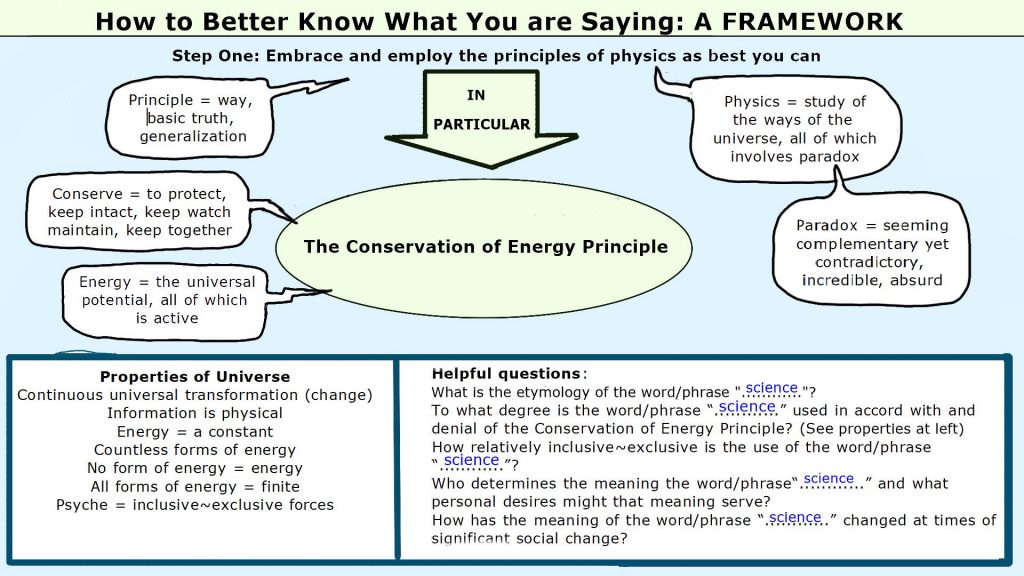
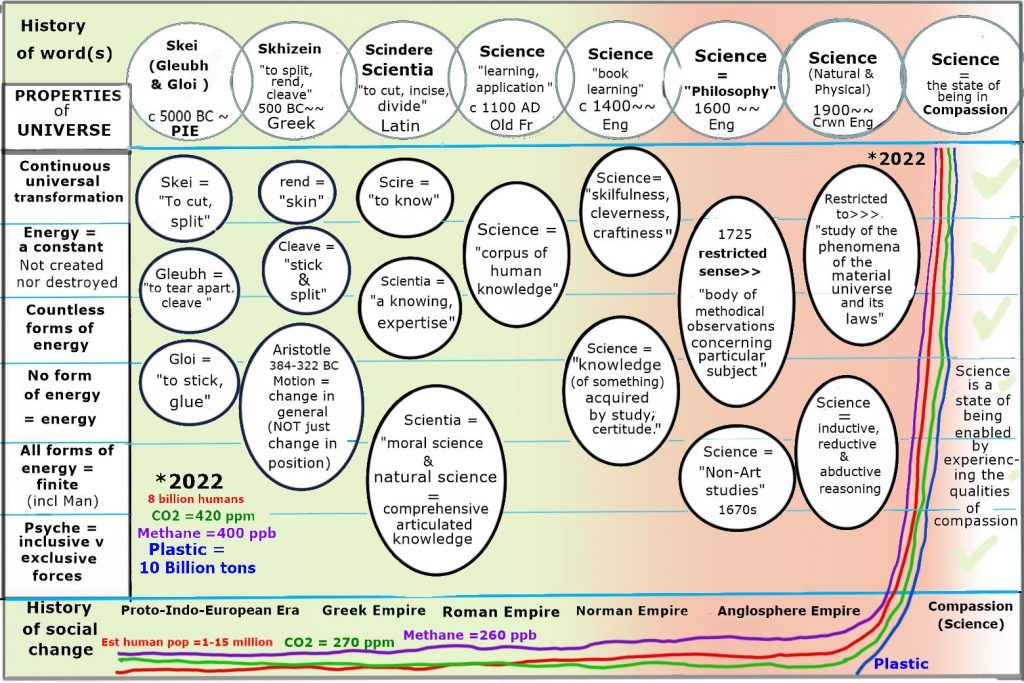
Notes on Transcendent Words and Phrases
The beauty of employing The Conservation of Energy Principle as our guide is that it enables us to transcend several thousand years of meaning at a glance. The ego is less able to bog us down in endless, divisive debate about minutiae and we are better able to see the fundamental patterns of language and behaviour.
A feature of sustainable languages is they contain many words that enable able us to transcend thought and paradox. Such inclusive words and phrases tend to be lacking in ego-driven, dualistic cultures, such as our Anglosphere culture.
Transcendent words form an anathema to those whose world-view frames the existence as “one or the other”, “in or out, “us and them”, “me and the environment”, “discrete or continuous” etc.
Those people with a more pluralistic world-view tend to be able to speak of “something being its opposite”, “in is out”, “we are each other”, “we are our environment”, “change is a constant”.
For instance, even as recently as the 19th century the word “man” simply meant any and all human beings. Nowadays many English speakers cannot imagine that “man” has not always exclusively meant “a male human being” and contrasts with “woman”.
This escalating dichotomy in the English language indicates escalating societal confusion and division, which is typical of the ego run rampant in a society. Indeed there are less than one hundred contronyms (aka “Janus words”, “auto-antonyms”), which is a fraction of a percent of the 20,000 most commonly used words out of a potential million words in the English language. Here is a list of English contronyms.
“Cleave” is one such contronym. Observe how the word arose from two words with very different meanings in Proto-Indo-European:
gleubh- “to tear apart, cleave.”
and
gloi- “to stick”, “glue” and “clay”.
Words such as “cleft” and “clever” arise from “cleave” while “glue” is associated with bonding or binding together.
The word “clay” is fascinating because the hygroscopic qualities of this form of rock can make it malleable -fluid while solid.
A multitude of religions and mythologies speak of how our human form arose from clay.
“Prometheus Creating Man in Clay” by Constantin Hansen
See a list at https://en.wikipedia.org/wiki/Creation_of_life_from_clay
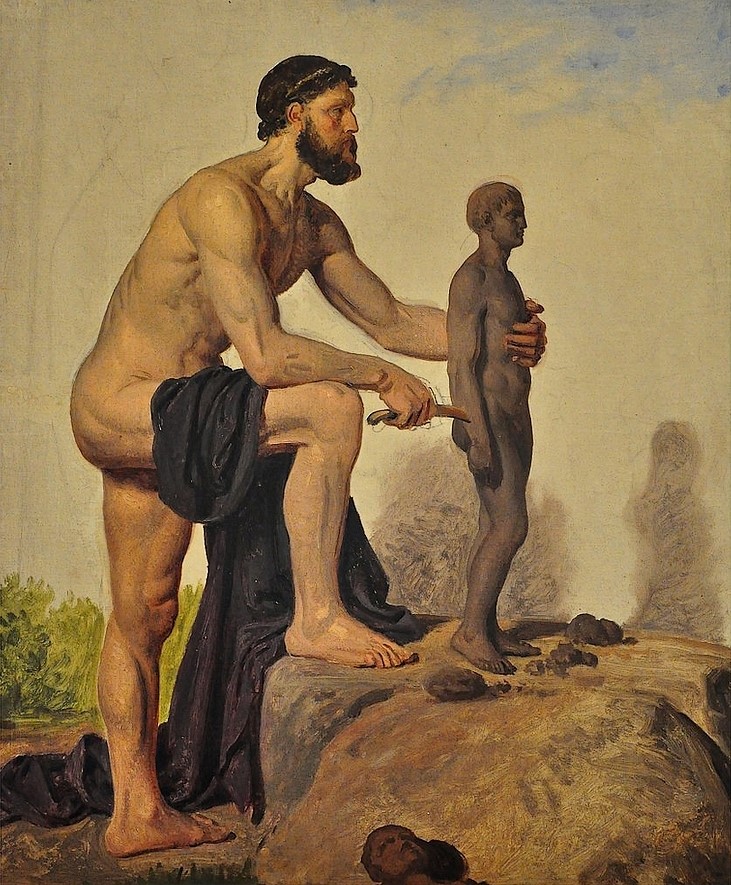
Some recent research indicates the amazing plastic properties of clay~water systems may have provided the essential temporal conditions required for life to form on Earth over eons. If so, it is well possible that all these myths are founded in true hope of physics.
In other words, the original meanings of the word “science” remind us of the paradox of our human condition and how we each exist as an exquisite, dynamic balance of inclusive (connective, sticky) and exclusive (divisive, splitting) forces.
We are being informed by all even as we inform all.
We cleave together even as we cleave apart.
We live a paradox of information: we experience uncertainty amidst knowledge.
Portrait of Socrates. Marble, Roman artwork (1st century), perhaps a copy of a lost bronze statue made by Lysippos -courtesy Wiki
The legends of Socrates had a significant impact on our notions of knowledge and there are many variations on this popular quote, some more helpful than others.

“The only true wisdom is in knowing you know nothing.”
― Socrates
A compassionate interpretation of this quote reminds us that wisdom and knowledge are not the same thing and very clever people can act in very unsustainable ways.
Compassion reminds us we are all fallible beings in that we can never experience true wisdom because we always know something. Some form of knowing occurs in any moment of self-awareness.
Compassion also reminds us of the limitations of thoughts and words: no amount of thinking or clever use of words can enable us to transcend our conundrum, our human condition. Our cleverness simply traps us in ever-spiraling thoughts generating delusions and hopelessness.
Meanwhile the ego (The “I”) in each of us insists that it, our “I”, knows all. It has us see only that which sates our greed. It has us hear only that which confirms its omnipotence. It has us feel only that which feeds its delusions of reality.
The ego is born of division, thrives in division and existentially fears reminders of our finite (mortal) role amidst the universal transformation. It thus lives in denial of the principles of physics, including the Conservation of Energy Principle.
It has us live in denial of the sustaining information and constant transformation of our vast intestinal microbiome.
It has us live in denial of the ancient wisdom of the myriad cells that inform our human form – wisdom garnered over billions of years of sentient evolution through unimaginable solar, tectonic, climactic and other epic change on Earth.
The ego’s situation at and as the fracture of our greater consciousness with self-consciousness means it has incredible, ingenious potential to determine our lives. This is because it can intermediate our most profound information flows.
Without compassion, the ego can easily have us be our own worst enemy.
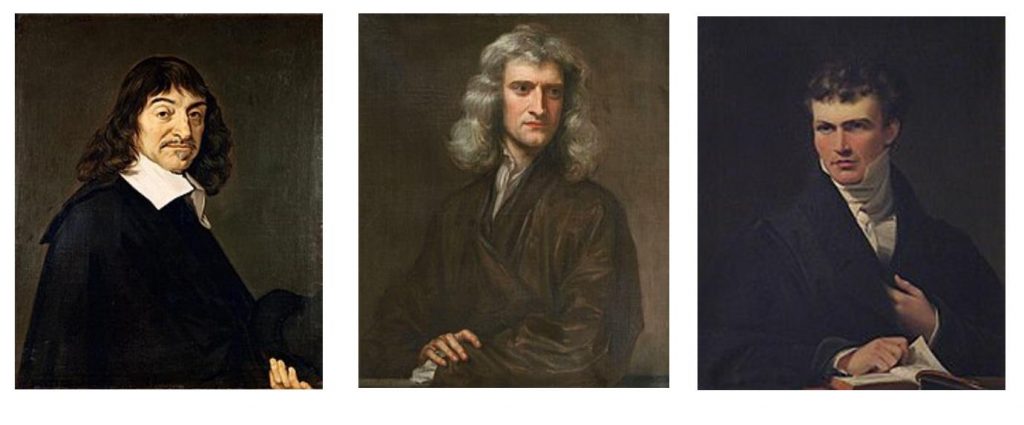
Each played a major role in the radical reformation of the English notion of “science” and the Anglo worldview in general.
This is the context in which , Rene Descartes, an innovative French mathematician, sat down one evening in 164O, picked up his pen and wrote “I am here quite alone and at last I will devote myself sincerely and without reservation to the general demolition of my opinions.” He concluded his devotion with the now world famous Latin statement “Cogito, ergo sum” (“I think, therefore I am.” )
This statement is true of the ego, the “I” in our psyche. In fact, this is a statement of and about the ego, which has us believe it is the never ending be-all. The ego would have us deny the far greater, holistic nature of our psyche.
One of the deepest, most enduring and destructive legacies of Descartes’ philosophizing is his thesis that our mind and body are actually distinct entities with the latter being incapable of thought.
This “Mind-Body” schism has become even more exclusive this past century with the advent of less invasive technology such as FMRI devices for exploring the mechanical, electrical, chemical and other potential of the brain. The “Mind-Body has effectively become the “Brain-Body” schism or split.
Descartes’ dualistic way of thinking and reflections resonated with and challenged another very innovative mathematician and inventor – Sir Isaac Newton in England. His enduring 1687 magnum opus, (Mathematical Principles of Natural Philosophy) can be seen as an attempt to discuss and improve on Descartes’s 1644 book Principles of Philosophy.
Newton is a towering figure in the course of modern history for other reasons too. For the last three decades of his life he was Warden and then Master of the Royal Mint 1696-1727 and fellow of the Royal Society (formerly The Royal Society of London for Improving Natural Knowledge) from 1672 and president (1703 -1727).
Newton’s role as Master of the Royal Mint means he was directly employed by The Crown – the merchant bankers of the City of London Corporation. The Bank of England, a privately owned bank, had just been founded in 1694, primarily to fund a war against France and financed by the Rothschild family of Europe.
Newton’s role as president of the Royal Society means he was bound to serve the prime role of the Royal Society, which was to ensure The Crown both controlled knowledge and maximized its capacity to add wealth to the merchant bankers.
Societies have for millennia maintained rituals and institutions limiting and controlling the flow of information. However none match Anglo copyright law in their global scale and extreme psychopathy. Indeed it contains the seeds of our destruction. This copyright regime inherently represses sustainable ideas and it thus forms an existential threat to Man’s existence. It actively destroys the global state of science i.e. it generates non-science wherever it is enforced on the planet.
Remember this is The City of London in the 17th C. This is the time and birthplace of the modern Anglosphere Empire, which is a belief system of such severe psychopathy that its principal adherents have combusted Earth’s biomass with an arrogance and ferocity that has brought humankind to the brink of extinction.
This period is known by various names, including “The Age of Enlightenment” (from Sanskrit “Bodhi”- “the awakened intellect of a Buddha”), “The Age of Reason” and “The Scientific Revolution”. Others, including the peoples of Africa, the Americas, India, China and Australasia, know it as the age of dispossession, usury, drug addiction, slavery and pollution:
https://climate.nasa.gov/climate_resources/24/graphic-the-relentless-rise-of-carbon-dioxide/
People breathed air containing carbon dioxide at a relative constant 280 parts per million in the 17th C . Now we breath supercharged air with carbon dioxide at about 420 parts per million and escalating.
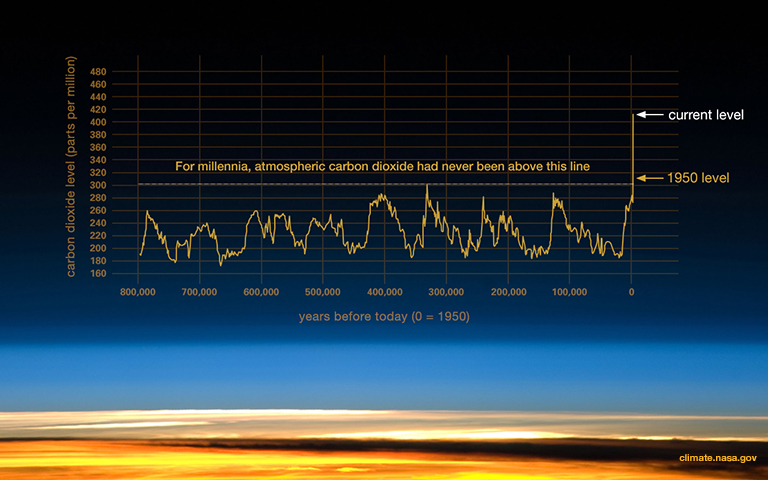
This is because “The Scientific Revolution” ushered in the era of the English Combustion Revolution (Aka the English Industrial Revolution), the City of London Corporation as the financial centre of the planet and The Crown dialect of English as the global language of “Business”.
It will generate the “Energy Conscious Age” in the 20th Century with the global reserve currency becoming the United States petro-dollar – a currency founded in the fatal delusion that mineral oil is energy and can be burned at the will of a few human beings.
Both Descartes and Newton thought of themselves as “philosophers” rather than as “scientists” but already since the 14th century a subtle and profound change in meaning of these words had been occurring, particularly since the Reformation and the advent of the printing press. “Philosophy”, once meaning the loving of wisdom, now came to be associated with just the ideas alone.
Similarly “ Science” , once pertaining to the active paradoxical state of cleaving, now also came to be associated with ideas alone, merely an amoral way of thinking.
And the word “Art”, once meaning the act of putting together with skill or
discernment , is now used to describe the product rather than the active personal learning and productive process. Now the artistic product becomes an object for usury while both the creator and the created are denigrated and abused. An exemplar is Vincent Van Gogh.
A common pattern emerges: all these words are becoming dissociated from compassion and moral consideration, so enabling the ego to prevail.
In June of 1833 another polymath, mathematician and “philosopher”, William Whewell, coined the word “scientist” at a meeting of the newly founded British Association for the Advancement of Science – now the British Science Association (BSA).
“As we cannot use physician for a cultivator of physics, I have called him a physicist. We need very much a name to describe a cultivator of science in general. I should incline to call him a Scientist. Thus we might say, that as an Artist is a Musician, Painter, or Poet, a Scientist is a Mathematician, Physicist, or Naturalist.”
https://www.etymonline.com/search?q=physicist
[William Whewell, “The Philosophy of the Inductive Sciences,” London, 1840]
Whewell’s statement is an exquisite exemplar of the exclusive, divisive force of the ego. It dis-empowers 99% of all human beings and 100% female human beings, enforcing our current unsustainable Anglosphere state in which fewer than 1% of us are deemed to be a “Scientist” or an “Artist”. Even fewer are deemed to be a Physicist or a Philosopher.
It is interesting to note that people like the great explorer of electromagnetism, Michael Faraday, objected to the word “scientist” because he believed he acted as a philosopher, a lover of wisdom. These people believes associating money (career) with their endeavour demeaned the vital spirit and act of loving inquiry. These essays are offered to the humankind in the same spirit.
Whewell’s 1840 statement occurred during the period when The Crown’s English Empire was brutally colonizing the most far-flung lands and their peoples on planet Earth using combustion as a weapon.
“Energy” and “work” are now being defined in terms of steam engines and conflated with “power”, which is soon to be conflated with “electricity”and Bulk-generated electrical products.
Fossilized biomass is being officially defined as “fossil fuel” while a “resource” is being redefined as any activity that adds wealth to The Crown i.e. the merchant bankers of The City of London Corporation. This conveniently means “fossil fuels” are considered “a resource” when they are burned.
Within a century this extreme psychopathy would be crystallized in the common delusional belief in:
- the Greenhouse World religion;
- a global accounting system enforcing the fatally flawed equation of “Energy”= “Fossil Fuels”= “Power” = “Electricity” =Bulk-generated electrical products , administered by “Ministers/Secretaries of Energy and/or Resources”
- “the Science of Economics” in which legions of professors, teachers, journalists and other apostles of The Crown promote the above and define the consequent vast dis-economy, war and pollution as “The Economy”.
Transcending the Quagmire of The Ego
A Notion of Science Informed by True Hope Born of Physics
“Truth is ever to be found in simplicity, and not in the multiplicity and confusion of things.”
Isaac Newton (1643 – 1727)
Legend has it that, two millennia before Newton, an Indian prince, Siddhartha Gautama, set himself the same challenge that Rene Descartes did. Instead of sitting at a desk all night with a pen and paper, it is said Gautama sat under a huge Bodhi tree and vowed to himself, “Even if my flesh and blood were to dry up, leaving only skin and bones, I will not leave this place until I find a way to end all sorrow.”
It is said that after forty nine days of rigorous, often tortured reflection Gautama basically concluded: “The cause of suffering is greed, selfishness and stupidity. If people get rid of these negative emotions, they will be happy.“
Legend has it that Confucius (Kong Qiu) in China about the same time was also concluding the same: “Life is really simple, but we insist on making it complicated…A truly great man never puts away the simplicity of a child…The firm, the enduring, the simple, and the modest are near to virtue…”
Confucius is also attributed with saying “Writing cannot express all words, words cannot encompass all ideas.”,which suggests he had a profound understanding of cognitive linguistics. The legend of his dialogue with Zi Lu indicates he had genius insights into Psychology~Physics:
https://en.apu.ac.jp/rcaps/uploads/fckeditor/publications/polyglossia/Polyglossia_V16_Qiao_Min.pdf
“Zilu said, The prince of Wei has been waiting for you to govern, what shall you do first?
The Master replied, The one thing needed first is the rectification of names.”
“The Master said: If names are not right, what is said does not accord with the truth.
When what is said does not accord with the truth, affairs cannot be carried on to success.
When affairs cannot be carried on to success, rites and music do not flourish.
When rites and music do not flourish, law and justice will fail.
And when law and justice fail, the people do not know how to move hand or foot.”
I, like most of my peers in the Anglosphere, was inculcated in the belief that thoughts and words are ethereal, even divine and there was no suggestion they, like all other forms of energy, are subject to the principles of physics. We learned as children the English chant,“Sticks and stones may break my bones but words can never hurt me”.
Adults who give care to their use of words are commonly ridiculed in our English culture as “pedants” and even abused as “trouble makers”.
Mine was a very different journey in a very different time to the same conclusion as that of Confucius: information is physical and we are our language. We are information beings, informing all even as we are informed by all.
We both live in periods of “Warring States” and perhaps this sensitizes a man (human being) to the physical nature, the physicality of all thoughts and words.
I was born into the Anglosphere (New Zealand Aotearoa), an English White Supremacist colony of The Crown in the South Pacific. Our Crown media saturated me in arrogance, hatred and fear of “Eastern” peoples. Smile. Aotearoa is equally East of London as it is West.
Names like Lao Tzu, Siddhartha Gautama (Buddha) and Confucius existed in my mind as dim, distant figures of ridicule for the first half century of my journey.
The notion that thousands of years ago their profound insights could have traveled across the Eurasian continent and far beyond by means of foot travel and word of mouth seemed ludicrous. It was impossible to imagine these Asian insights may have informed sages like Socrates and Jesus of Nazareth.
Our Crown teachers even had us deny the truth that the ancestors of Maori navigated vast reaches of the Great Pacific Ocean at the time of these sages.
These days I am humbled in the realization that, for instance, our notion of meritocracy (quality universal education, health and justice) arises from these ancient sages. The Jesuit accounts in the 16th C of such scientific and democratic practices in China caused a furor in Europe with the feudal overlords of Europe reacting by demonizing Asian people to this day.
Confucius’s quote about how and why our careful use of our language is critical to our survival conveys extraordinary insight into the Psychology~Physics of our human situation. It is in stark contrast to the beliefs of our Anglosphere media.
The leaders of our modern feudal corporations would have us deny both the physical nature of our language and the principles of energy even as they invest vast sums of money in branding and in ensuring their ego-derived meaning of a word prevails in legislation and daily discourse.
Similarly legend has it Siddhartha Gautama advised,
“Everything changes, nothing remains without change…All conditioned things are impermanent’ — when one sees this with wisdom, one turns away from suffering…Change is never painful, only resistance to change is painful.”
This indicates Gautama Buddha also had extraordinary insight into the Psychology~Physics of our human situation and had a clear appreciation of the truths of the Conservation of Energy Principle, this being reflected in his lifestyle.
It is both humbling and reassuring for me to know my conclusions about the nature our existence occurred prior to my realization they are in accord with those of Confucius, Gautama and other great sages. It indicates this essay has ancient foundations in cultures that for millennia bequeathed our current generation a sustaining planet. This vision gives me courage to question our status quo.
As we have seen, the meaning and behaviour associated with “science” radically changed about the 15th century as the English language and culture became far more ego-driven. The concept of science became extremely exclusive and amoral as it lost its compassionate meaning. Whereas it was once associated with a profound moral state or way of being, “science”, is now limited to being a deductive way of thinking and an exclusive “Corpus of knowledge”, the domain of an elite of people called “scientists” who are paid to live their days in silos.
It would seem recent developments in Artificial Intelligence compounds this exclusivity, judging from ChatGPT ‘s answer in August 2023 to the question “What is Science?”
Question: What is Science?”
Answer: Science is the intellectual and practical activity that encompasses the systematic study of the structure and behaviour of the physical and natural world through observation and experiment12. Science is also a system of knowledge that is obtained and tested through the scientific method23, which involves making hypotheses, collecting data, analyzing results, and drawing conclusions4. Science can be divided into different branches or disciplines, such as physics, chemistry, biology, astronomy, geology, etc123.
Learn more:
1. bing.com 2. merriam-webster.com 3. dictionary.cambridge.org 4. en.wikipedia.org +1
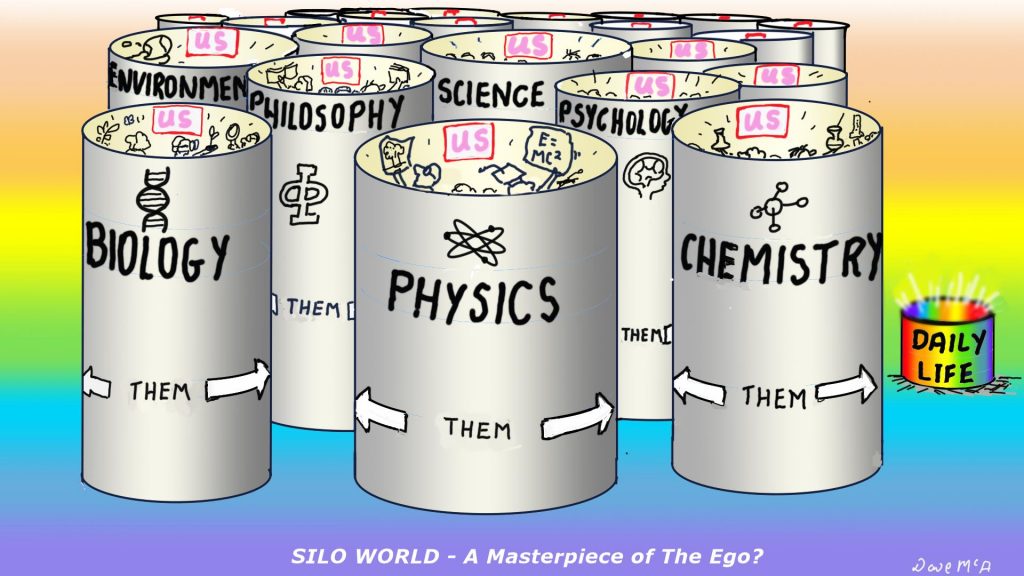
Note: the cartoon of the information silos is from the essay “What is Physics?
A Quick Reminder of Our Anglo Status Quo
In The Spirit of the Ancient Sages and Our Children
So let us assume nothing about our notion of science, adopt a very simple approach and inquire with wonderful spirit of a child, “What are the requisites for science to exist?”
This draft list of the requisite qualities comes to mind:
- humility and inclusiveness;
- collegiality, openness and sharing;
- inquiry, wonder and forgiveness;
- honesty and trust;
- generosity of time and reflection;
It occurs that these are not mere ways of thinking. These are all profound ways of being and they have one quality in common — they are all active elements of compassion. And what is compassion? It is the inclusive force in our psyche counterbalancing the exclusive force of the ego.
There are at least seven profound implications of this definition of science:
- science is fundamentally a moral state of being;
- a better question is “What are the requisites for us to experience the state of science?”
- the genesis of the state of science in our experience of compassion means the ultimate motivation of the scientific person is to reduce suffering;
- we experience the state of science in any moment of self-awareness to some degree;
- science is a state of being that involves transcending paradox;
- science is a state of being that enables us to develop all manner of sustaining arts (skills) i.e. Civics;
- science is a state of being that embraces the Conservation of Energy Principle as central to our existence.
A consequence of these implications is that, science being a profound way of living in accord with the Conservation of Energy Principle, then both its methods and the Conservation of Energy Principle form the foundation of every aspect of our education curriculums. See exemplar at
Psychology and physics are understood to be inextricably linked: psychology~physics.
This is because our notion of energy determines how the universe is manifest in our lives.
Also the Conservation of Energy Principle advises us that energy is continuous universal transformation and it is so bounteous it can usefully be understood to be a constant. This great enduring principle underpins and informs all lessons of every type in a Compassionate Curriculum Framework, whether it be the study of language, history, geography, drawing, physics, chemistry, biology, technology, information systems, mathematics or Civics in general.
A profound implication of this psychology~physics is a heightened awareness that every child is born into a considerable state of compassion and thus science. There is no need to “instill scientific practice” in children. Rather the prime duty of the educator is to acknowledge and conserve this vital, inherent state of being in the child.
Such conservation and cultivation of the child’s state of science most truly happens when the educator’s own lifestyle is in accord with the principles of physics.
Indeed, such harmony may well be essential. To the extent the educator’s lifestyle is unsustainable, it will be manifest as discord that corrodes the child’s state of compassion and destroys their state of science.
Be mindful: language is physical and subject to the principles of physics, which means we are our language.
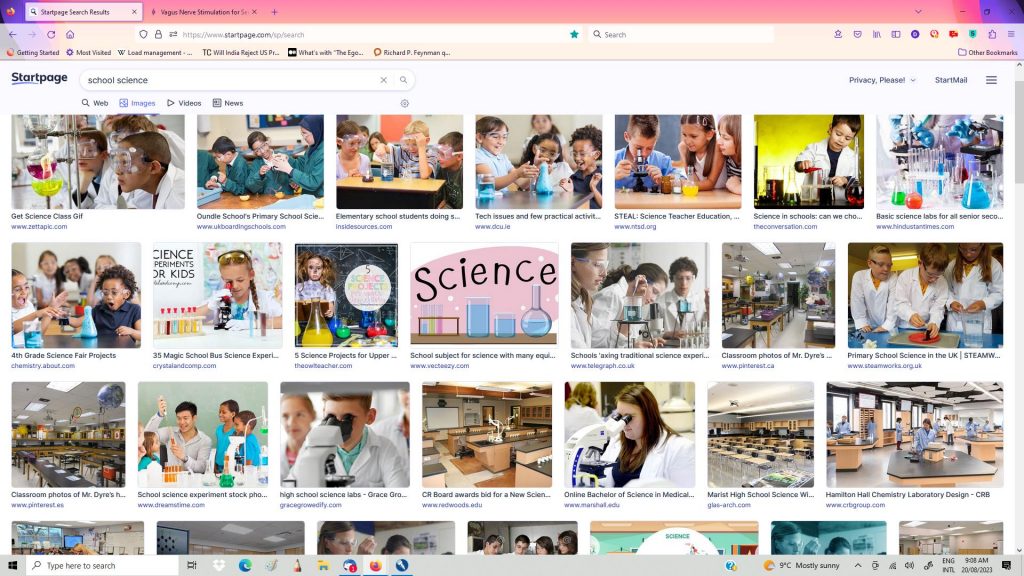
Our English educators’ introduction to and definition of “the scientific process” typically reads thus, “The four steps of the scientific method are to make observations, make a hypothesis, test your hypothesis, and make a conclusion.”
Some English educators teach that there are, for instance, 8 “Science skills”:
Observing
Classifying
Quantifying
Predicting
Controlling variables
Interpreting
Communicating
Forming conclusions
Other English educators teach there are, for instance, 9 “main characteristics of science”:
- Objectivity
- Verifiability
- Ethical Neutrality
- Systematic Exploration
- Reliability
- Precision
- Accuracy
- Abstractness
- Predictability.
Compassion advises us that we should inquire of and evaluate each of these statements according to the list of requisite qualities for science to . Here are a few examples of a multitude possible inquiries.
What is “verifiability”? Does it mean the free sharing of information so that others may learn from it, experiment with it, seek to replicate and improve its truths and reduce global suffering with it? If so, then all privately owned copyright is non-science because it violates and represses peer review. A child of five can see this.
What is “ethical neutrality”? Does it mean we human beings are not mortal, moral beings and we can act without reference to the principles of physics?
If so, where is the proof that any amoral or ethically indifferent action does not somehow impact on how the universal transformation is manifest to us?
Could it be the notion of human “neutrality” actually denies our role as stewards amidst the universal change?
What is meant by “objectivity”? If it means “freedom from bias”, then this definition is unscientific and meaningless because, according to the Conservation of Energy Principle, no man (human being) is without bias.
Indeed a paradox of information is that men who believe they exist without bias are the most vulnerable to the delusions and deceits of the ego. They are most likely to divorce their “scientific endeavour” from their lifestyle – their lifestyle being their ultimate communication. How do we best transcend this paradox?
What is “Systematic Exploration”? With whose system do we explore and why? Does it merely involve a systematic way of thinking? Does it involve a systematic way of living? Does it matter if our thoughts and deeds are dissonant?
Any sustainable exploration tends to begin with an open question. So how do we cultivate a generous spirit of inquiry that enables our questions to be inclusive, open and trusting so they permit the universal potential to be manifest in the most sustaining way?
This Systematic Exploration requires skills at “communicating” because we are our language. Communicating is a paradoxical exercise in being informed even as we inform all.
Recall how Confucius advises us that for true civilization to flourish we must first of all endeavour to rectify (correct) our language. This advice holds true because the ego can too easily dictate our communication, corrupt our finest intentions and cause us to perish in lives of hatred, self-deceit and delusional behaviour. Without compassion, we tend to lead deprived lives of non-science.
How do we best communicate with ourselves, with others, with the universe? How do we transcend the paradox of information?
Summary Statement
We all exist as finite, paradoxical balances of the forces of the universe. We are all born with a balance of compassion and thus, from our earliest moments of self-awareness, we experience a generous, honest spirit of open, sharing, wonderful inquiry.
This we can know as “science”. It is a state of being that enables us to enjoy true hope of physics, which in turn enables the universal potential to be manifest in more sustaining ways.
The gift is to be able to conserve this sacred balance even as we mature to become adults and the ego develops ever more incredible and ingenious ways to have us deny the principles of energy.
In this context, the ultimate evaluation of an education system is whether or not its graduates conserve the flows and balances that sustain humanity. The Anthropocene that now imperils us all did not occur in a vacuum. It is the product of non-scientific and thus uncivil education systems. Our salvation depends on correcting our Crown dialect of English so our language once again embraces the wisdom of antiquity and the principles of energy.
We ignore and deny these truths of physics at our peril.
………………………………………
Footnote
The use of the Conservation of Energy Principle as a benchmark for evaluating the relative sustainability of our use of a word can in many ways be revealing of our behaviour. It not only enables us to transcend the ingenious self-deceits and delusions of the ego and perceive patterns of behavioural change. It also enables people like myself who were taught deceitful, self-serving versions of history to ask questions that reveal more truthful versions of our history.
For instance, the ChatGPT search provided The Crown English narrative of “Science” whereas questions based on the notion that information is physical (we are our language) generated far more holistic insights into Isaac Newton’s life and times and influence.
This is why the Intriguing History account of the history of the Bank of England is probably far more sustaining (truthful) than the Bank of England’s history of itself even though it too excludes discussion of the nature of The Crown and the governance of the supposed “nationalized” bank.
https://www.bankofengland.co.uk/about/history
https://intriguing-history.com/bank-of-england-history/
https://home.uni-leipzig.de/energy/energy-fundamentals/01.htm

